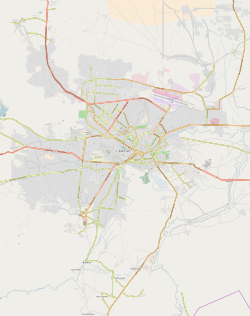Attack
The suicide bombing occurred at approximately 10:40 p.m. Afghanistan Time (UTC+04:30) in western Kabul, in an area heavily populated by the Shia Hazara minority, inside the "Dubai City" wedding hall. [10] [11] The suicide bomber detonated the explosives in the men's section [12] of the wedding hall, near the stage where musicians were playing, [13] at a time when hundreds were inside the building for a wedding ceremony. [14] The bomber detonated a suicide vest packed with ball bearings. [15]
The explosion occurred shortly before the wedding ceremony was supposed to start. [13] According to the wedding hall's owner, more than 1,200 people had been invited to the event, with a mixed group of Shi'ites and Sunnis attending. [16] Most of the attendees were ethnic Hazaras. [6] Both the bride and the groom were Shi'ite, [6] and both from modest working class families, with the groom working as a tailor. [15] Their families had discussed how to schedule the timing of the wedding to try to minimize the risk of an attack. [15]
At least 63 people were initially killed and 182 injured. While the bride and groom survived, both lost several family members. Many children were also among those killed. [6] 17 more people succumbed to their injuries in the days after the attack, bringing the death toll to 80. [5] The final death toll was put at 92.
Responsibility
The day after the attack, a local affiliate of the Islamic State of Iraq and the Levant (ISIL, also known as ISIS, the Islamic State, or Daesh) claimed responsibility for the attack. [17] [18] The statement of responsibility claimed that after the suicide bombing inside the wedding hall, a car bomb was also detonated outside as emergency vehicles were arriving. [19] The follow-up car bombing has not been confirmed by the authorities. [20]
The Taliban denied responsibility for the attack, [6] [21] with a spokesman stating that the Taliban "condemns [the bombing] in the strongest terms". [6]
This page is based on this
Wikipedia article Text is available under the
CC BY-SA 4.0 license; additional terms may apply.
Images, videos and audio are available under their respective licenses.

